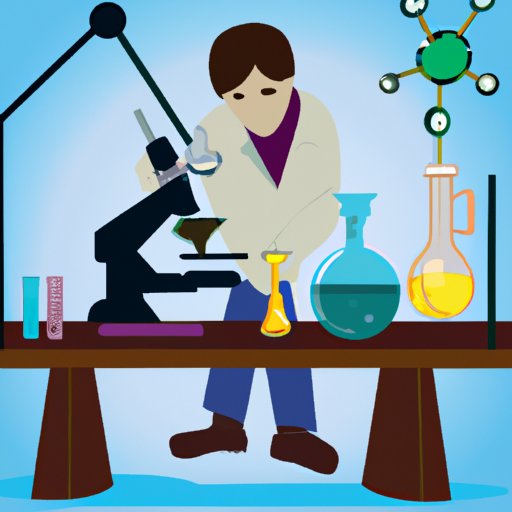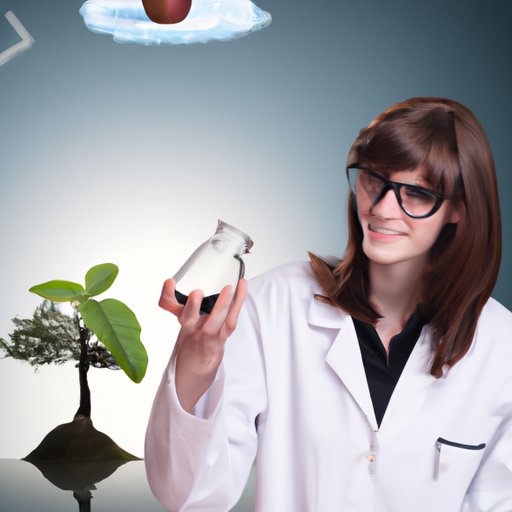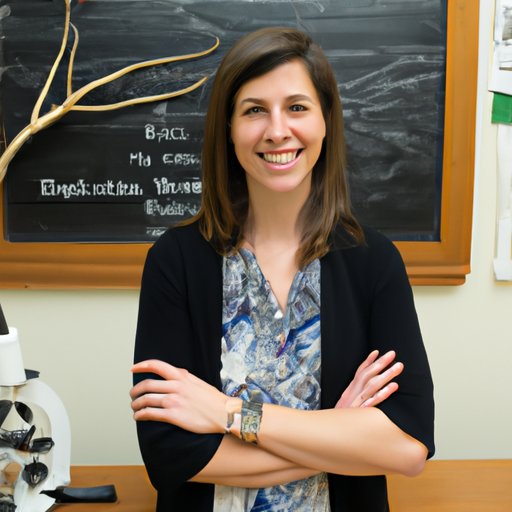Introduction
A biological science degree focuses on the study of living things and their environment. It can provide an understanding of the scientific principles behind biology, allowing graduates to pursue a variety of careers. Those with a degree in biological science can explore career paths in research and development, environmental issues, teaching, and healthcare.
Exploring Career Opportunities with a Biological Science Degree
A degree in biological science provides a foundation for many different career paths. The following sections explore some of the potential opportunities available to those with a degree in biological science.
Working in Research and Development
Research and development is a field that requires an understanding of the scientific principles behind living organisms. Those with a degree in biological science can find work as researchers in laboratories or research centers. They can also work as product developers, creating new products related to biology.
Working in Environmental Issues
Those with a degree in biological science can also pursue a career in environmental issues. For example, they may work in conservation and sustainability, helping to protect the environment from harm. They may also work with non-profit organizations to raise awareness of environmental issues and promote sustainable practices. Additionally, they can pursue a career in environmental law, advocating for change and protecting the environment.
Teaching with a Biological Science Degree
A degree in biological science can also be used to pursue a career in teaching. Those with a degree in biological science can become college professors, teaching courses related to biology. They can also become high school teachers, educating students about the various aspects of biology.
Pursuing a Healthcare Career with a Biological Science Degree
A degree in biological science can also be used to pursue a career in healthcare. Those with a degree in biological science can become medical scientists, conducting research to improve healthcare. They can also become clinical lab technicians, working in laboratory settings to analyze samples. Additionally, they can become physician assistants, providing direct patient care in a variety of healthcare settings.

Utilizing Your Biological Science Degree in Research and Development
Those with a degree in biological science can find work as researchers in a variety of fields. According to the U.S. Bureau of Labor Statistics, the median annual wage for biological scientists was $83,420 in May 2019.1 There are several types of research positions available to those with a degree in biological science.
Types of Research Positions
Those with a degree in biological science can work as research scientists in a variety of fields. They may work as biomedical scientists, studying the effects of diseases and developing treatments. They may also work as biochemists, studying the chemical processes of living organisms. Additionally, they may work as environmental scientists, researching the impact of human activities on the environment.
Preparing for a Role in Research
In order to pursue a career in research, those with a degree in biological science should consider continuing their education. A master’s degree or doctorate in biological science can provide a deeper understanding of the scientific principles behind biology, allowing them to pursue more advanced research positions. Additionally, they should consider gaining experience through internships or volunteer work in the field of research.

Applying Your Biological Science Degree to Environmental Issues
Those with a degree in biological science can also pursue a career in environmental issues. They may work in conservation and sustainability, helping to protect the environment from harm. According to the U.S. Bureau of Labor Statistics, the median annual wage for conservation scientists was $61,310 in May 2019.2
Working in Conservation and Sustainability
Those with a degree in biological science can work in conservation and sustainability, helping to protect the environment from harm. They may work as environmental scientists, researching the impact of human activities on the environment. They may also work as conservationists, managing natural resources and promoting sustainability. Additionally, they may work as environmental engineers, designing solutions to protect the environment.
Working with Non-Profit Organizations
Those with a degree in biological science can also work with non-profit organizations to raise awareness of environmental issues and promote sustainable practices. They may work as program managers, developing and implementing programs to protect the environment. They may also work as fundraisers, raising money for environmental initiatives. Additionally, they may work as public relations specialists, communicating with the public about environmental issues.
Pursuing a Career in Environmental Law
Those with a degree in biological science can also pursue a career in environmental law. They may work as lawyers, advocating for change and protecting the environment. They may also work as policy analysts, researching and analyzing laws related to the environment. Additionally, they may work as lobbyists, advocating for legislation that protects the environment.

Pursuing a Teaching Career with a Biological Science Degree
A degree in biological science can also be used to pursue a career in teaching. Those with a degree in biological science can become college professors, teaching courses related to biology. According to the U.S. Bureau of Labor Statistics, the median annual wage for postsecondary teachers was $79,540 in May 2019.3
Becoming a College Professor
Those with a degree in biological science can become college professors, teaching courses related to biology. They may teach courses such as anatomy and physiology, genetics, biochemistry, and microbiology. Additionally, they may conduct research in their field and publish their findings in scientific journals.
Becoming a High School Teacher
Those with a degree in biological science can also become high school teachers, educating students about the various aspects of biology. They may teach courses such as biology, ecology, and anatomy. Additionally, they may help students prepare for college by teaching courses such as chemistry and physics.
Pursuing a Healthcare Career with a Biological Science Degree
A degree in biological science can also be used to pursue a career in healthcare. Those with a degree in biological science can become medical scientists, conducting research to improve healthcare. According to the U.S. Bureau of Labor Statistics, the median annual wage for medical scientists was $88,790 in May 2019.4
Becoming a Medical Scientist
Those with a degree in biological science can become medical scientists, conducting research to improve healthcare. They may conduct research on diseases and develop treatments. They may also develop medical devices and diagnostic tools. Additionally, they may work in clinical trials, testing new drugs and treatments.
Becoming a Clinical Lab Technician
Those with a degree in biological science can also become clinical lab technicians, working in laboratory settings to analyze samples. They may analyze blood, urine, and other bodily fluids for signs of disease. They may also use microscopes to examine tissue samples for abnormalities. Additionally, they may perform tests to identify bacteria and viruses.
Becoming a Physician Assistant
Those with a degree in biological science can also become physician assistants, providing direct patient care in a variety of healthcare settings. They may diagnose and treat illnesses and injuries. They may also order tests and interpret results. Additionally, they may provide advice and support to patients.
Conclusion
A degree in biological science can open the door to a variety of career paths. Those with a degree in biological science can explore opportunities in research and development, environmental issues, teaching, and healthcare. When deciding which path to pursue, it is important to consider your interests, skills, and goals. It is also important to research potential employers and job openings in order to find the right fit.
In summary, a degree in biological science can lead to a variety of career paths. Those with a degree in biological science can find work as researchers in laboratories or research centers. They can also work in conservation and sustainability, helping to protect the environment from harm. Additionally, they can become college professors, teaching courses related to biology. They can also become medical scientists, conducting research to improve healthcare. No matter which path you choose, a degree in biological science can open the door to a rewarding and fulfilling career.
(Note: Is this article not meeting your expectations? Do you have knowledge or insights to share? Unlock new opportunities and expand your reach by joining our authors team. Click Registration to join us and share your expertise with our readers.)
